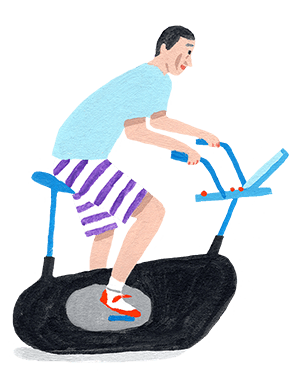- resources
- Stay Active, Stay Healthy
Stay Active, Stay Healthy
When you get yourself moving, it’s a gift to both body and mind. In this chat with our medical director, Dr. Lindsay Carter, we discuss how much physical activity to get each week and why it’s so important.

Q&A with Dr. Carter
Does physical activity really make that big a difference?
Yes! Study after study clearly shows that lack of movement leads to poor health. A lifestyle where you regularly sit more than 8 hours a day may actually be killing you. That’s not an exaggeration. Physical activity is that important.
How does movement keep us healthy?
For starters, it improves your brain health. Instantly. When you exercise, you change how you think and feel. Over time, regular physical activity lowers your chances of getting and dying from chronic diseases like heart disease and diabetes.
Any other benefits?
I could go on all day. We have newer research showing that regular physical activity lowers your risk of common cancers, like breast, colon, and lung cancer.
Do you have to be a gym rat to get these benefits?
Not at all. Exercise is part of it. But it’s also about looking for little ways to move more throughout your day, like:
- Take the stairs instead of the elevator or escalator
- Park further back in the parking lot so you have to walk more
- Use a standing desk
- Have walking meetings with co-workers
- Stand or stretch while watching TV
- Go for a walk when you make a phone call
How much physical activity do I need?
The Physical Activity Guidelines for Americans, the American Cancer Society, and the American Heart Association all agree that adults should get 150 to 300 minutes a week of activity that’s moderate in intensity. Or 75 to 150 minutes a week of more vigorous activity.
If you don’t like counting the minutes, another good guideline is to get 10,000 steps a day.
What’s the difference between moderate and vigorous intensity?
Moderate intensity includes things like:
- Brisk walking
- Light bicycling
- Heavy housework, like vacuuming or scrubbing
Vigorous intensity includes:
- Hiking
- Faster bicycling
- Jogging
Are the guidelines the same for older adults?
They are. But some activities are harder for older adults, especially if you have chronic conditions. Before starting any exercise program, talk to your doctor about what’s safe and right for you.
Is it ever too late to start exercising?
No. Just start small. This is one of the amazing things about the body. As harmful as it is to go without physical activity, you can reverse the effects of too much sitting.
Any tips for folks looking to get started or add more activity to their day?
It helps to set fitness goals and make a plan to help you reach them. And like I said, start small. Let yourself have some early wins and feel successful. The Office of Disease Prevention and Health Promotion has a free, online tool that can help you plan your weekly activity.
Do Devoted Health plans have fitness benefits for members?
They sure do. Our plans include:
- SilverSneakers, which gives you free access to gyms and online classes
- Wellness Bucks, where we pay you back for purchases like a step tracker or home exercise equipment
Learn more about your plan benefits.
The Takeaway
Physical activity is the closest thing we have to a fountain of youth. Here’s what to remember:
- Get yourself moving every day — it’s good for your body and mind.
- It’s never too late to start. Check with your doctor to know what’s safe for you.
- Set reasonable, clear goals and make a plan to reach them.
Disclaimer
This article is for general reference only. Always talk to your doctor or other health professional for medical advice.
SilverSneakers is a registered trademark of Tivity Health, Inc. © 2025 Tivity Health, Inc. All rights reserved.